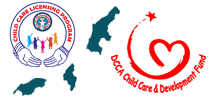Childcare Options
Steps to Finding the Best Child Care for Your Family
There are several other options of child care that a family might be eligible for. Please read more about them to see if your family qualifies and they fit the needs of your family. Some may be licensed child care and others might be exempt child care.
Head Start and Early Head Start (HS and EHS)
If you qualify, Head Start and Early Head Start programs provide free learning and developmental services to children aged birth to 5 from low-income families. Some Early Head Start programs also provide prenatal services for pregnant women. To find out more or to see if you are eligible visit:
The Early Childhood Assistance Program (ECAP)
The Early Childhood Assistance Program (ECAP) is a state-funded, comprehensive child development program for income-eligible families with preschool age children in Delaware. The Office of Early Learning (OEL) contracts and partners with public and private early learning programs to deliver ECAP services to 845 three-year-old and four-year-old children statewide.
Exempt Child Care Providers
Some child cares providers do not need a license and are Licensed Exempt. These types of programs should apply for an Exemption Letter from the Office of Child Care Licensing (OCCL).
Child care providers that do not need a license include;
- Camps with permits from public health;
- Programs run by the State of Delaware;
- Summer religion classes that last less than a month;
- Programs where parents do not leave;
- Programs that offer free activities for children, six or older. The children can come and go as they please. There is no agreement with parents that care is provided;
- Programs for school-age children that meet an emergency or special need.
- Programs for school age children that teach lessons, for example, dancing, karate, or painting;
- Programs registered with the Department of Education and run by schools that provide regular and thorough instruction through at least 6th grade.
Summer Camp
There are important things to consider when choosing a quality summer camp. In Delaware, many camps are exempt from child care licensing regulations. Families should always, ask questions and look closely at the facilities before enrolling their children. The questions below can help you evaluate the camps you are considering. Remember! Cost is not necessarily an indication of quality.
Families’ Needs
- What age campers are accepted?
- Are you comfortable with how age groups are separated?
- Do the hours and dates fit your schedule? Is before and after care available?
- Do you need to provide food and/or other supplies?
Camp Program
- Does the camp have a permit from the Division of Public Health?
- Is your child interested in the themes/activities that are offered?
- Does the program repeat or are new activities offered each week?
- Are there a variety of activities and a balance of activity and rest periods?
Staff
- Are staff trained in first aid and CPR on site at all times?
- Are background checks completed?
- Are the children supervised at all time? (Restroom trips, clothing changes, eating, resting, etc.)
- What is the staff to child ratio?
- Are staff designated for each group of children?
Environment
- Is there enough safe, clearly defined space?
- Does the outside area have mostly grass and available shade?
- Are clean restrooms and drinking water available and close by?
- Is there an indoor area accessible for inclement weather?
Relative Care for Non-traditional Hours
Families who request Purchase of Care funding for a relative to provide child care during non-traditional hours must abide by the following policies.
- The relative providing care must be related to the child by:
- Marriage
- Blood relationship
- Court decree
- The relative providing care must be related to the child in one of the following relationships:
- Great-grandparent
- Grandparent
- Adult sibling
- Aunt
- Uncle
- The relative provider shall:
- Be 21 years of age or older
- Only provide care for the children of one family member
- Only provide care during non-traditional hours that are not normally offered through a licensed child care provider. Relative care is limited to evening and weekend shift work hours only.
- The relative provider must successfully complete professional development requirements offered by the Delaware Institute for Excellence in Early Childhood(DIEEC) Professional Development Department at University of Delaware:
- The “Criminal History, Child Abuse, and Neglect Background Request Form.” This form must be completed for the relative provider and each individual 18 years of age or older who is living in the relative provider’s home.
- The orientation class on relative child care rules and regulations
- 28 hours of approved training within 12 months of completing the relative child care orientation class
- 3 hours of health and safety training annually
- CPR and first aid classes. The relative provider’s certification must be current and re-certifications must be completed every 2 years.
- In the children’s home, the relative provider shall:
- Care for a minimum of four children in the home. The total number of children who are cared for in the home may not exceed a maximum of five children
- Care for no more than two children under two years of age
- Care for the children of one family member. The children must be related as siblings.
- In the relative provider’s home, the relative provider shall:
- Care for a minimum of one child in the home. The total number of children who are cared for in the home may not exceed a maximum of five children
- Care for no more than two children under two years of age.

